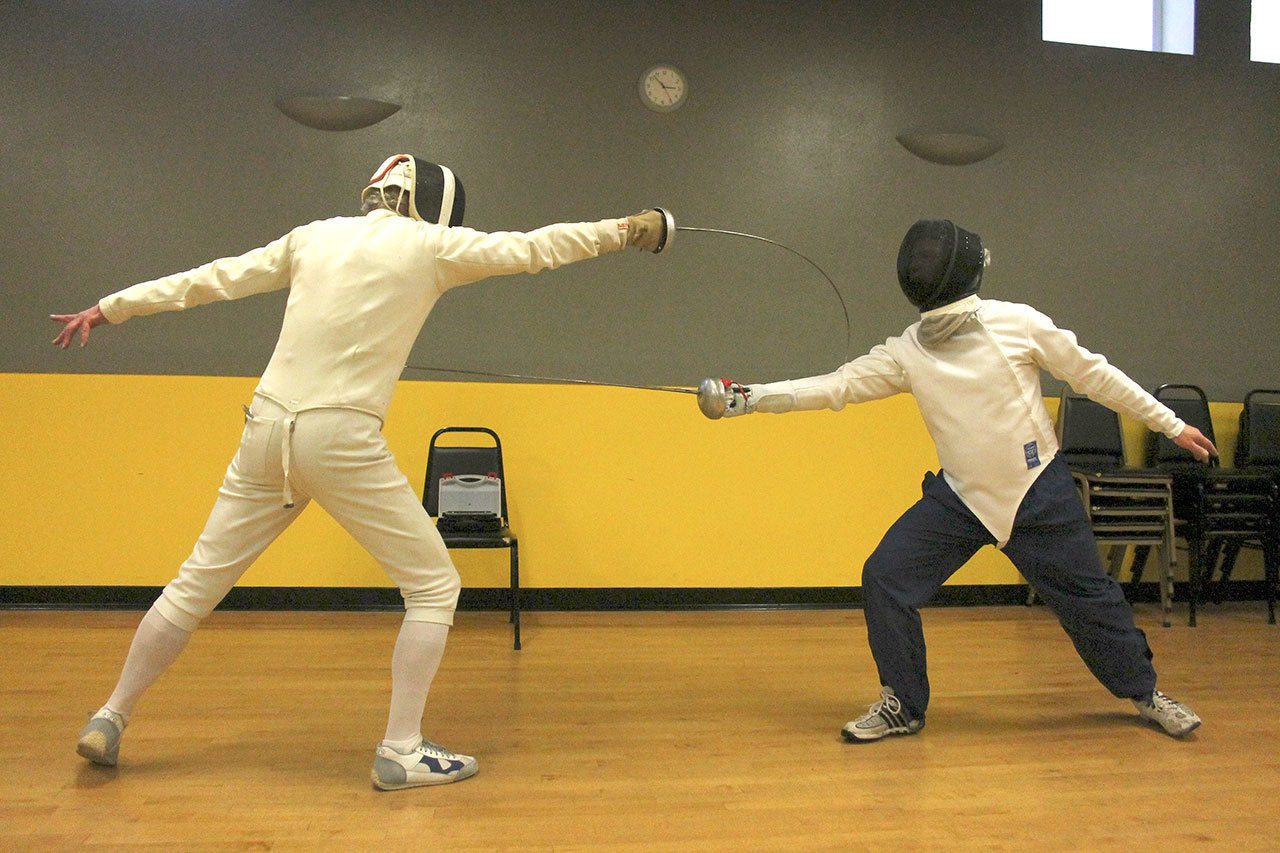Inside Island Athletic Club in Freeland, the sound of panting and crashing weights is what normally echoes throughout the gym.
But on a Saturday afternoon, other unexpected sounds reverberate through the fitness club: the sound of clashing metal and the muffled hooping and hollering of masked duelers. These are the sounds of South Whidbey’s fencers, Bayview resident Joseph Kleinman and Freeland resident Bob Tearse.
“We don’t do this enough, I’d like to start doing this maybe once or twice a week,” Kleinman said. “We just need more recruits to get the sport going here on the island.”
As far as they know, Kleinman and Tearse are South Whidbey’s only active fencers. Their armed sparring sessions started with a simple post to Drew’s List from Kleinman, after he realized he hadn’t fenced in a long time. Tearse, a former instructor with more than 20 years of teaching experience under his belt, responded to the post to set up sparring sessions. Having more than 40 years of fencing experience himself, Kleinman thought the two were evenly matched, and that is evident when they spar on the waxed wooden floors of the gym’s fitness room. Both competed in fencing competitions in their younger days, with Kleinman even claiming he defeated a Russian national champion in epee, one of three forms of fencing.
Along with the clinking of steel swords, shouts of “I’m hit,” or “Allez,” also sound through the room. A scoring machine buzzes and flashes colors to indicate who was hit first — fencing jackets are lined with score-tracking electronics. Gym members regular stop and watch, fascinated by a rare Whidbey sight. It’s all fun and games for them, but the competitive fire still burns within Kleinman and Tearse.
“What we mainly do is sparring, but we often do bouts and that’s when everything gets serious,” Kleinman said. “That’s when we need a third person to referee. Without one we only have our opinions and things can get testy. But everyone is friends at the bar.”
Both Kleinman and Tearse train with all three forms of fencing: foil, epee and saber, which use different weapons. The foil is the fencing version of the European court sword and uses the lightest weapon. Epee is based from the dueling rapier, and saber comes from the cavalry weapon, and uses the heaviest weapon. The three forms have different scoring systems, with some focusing more on the attack and others on defense.
Tearse says the sport derives from Europeans who trained for duels.
“Fencing became a sport when it became unacceptable to kill people,” Tearse said with a chuckle. “If you were going to duel, you had better practice fencing.”
There’s some truth in Tearse’s statement about the sport’s origins. Practicing for duels essentially became fencing, where European duelers had to learn to attack and defend using only a blade. The sport gained popularity in the “14th or 15th century” after Italian and French masters penned books on the sport. Nowadays, Kleinman and Tearse say fencing talent covers the globe from Hungary to Russia to China.
According to Kleinman and Tearse, fencing is a sport that uniquely blends athleticism with strategy. It requires agility and quick reflexes to react to an opponent’s movements, and can result in a “great aerobic exercise.” The sport quickly develops motor skills in young fencers, and can give them a more methodical approach to sports.
Tearse concludes fencing is a blend of numerous sports, but with weapons.
“I’d like to think fencing is a melding of ballet and boxing,” Tearse said. “In ballet, there’s the balance, the poise and the response to your partner’s every move. In boxing, you have this one-on-one competition, a fight to the death without exposing yourself. Fencing combines the two.”
Eventually, Kleinman says he’d like to promote the sport for South Whidbey’s youth. Since both have more than 20 years of experience training kids, they’re aiming to start a club that regularly meets to spar. They both think it’s a game that could quickly gain popularity on the South End with younger kids, especially since individual sports seem to thrive. The cognitive skills improved from fencing also adds an educational component, similar to playing chess. Kleinman adds that picking up the sword again brought back much of his youthful exuberance, and he hopes growing the game on South Whidbey will do the same for others.
“Once I moved here, it was a drought but hopefully we’ll water the desert and people will show up,” Kleinman said. “I’m sure there are others who would like to dust off the rust. Not everyone who learned the piano still plays.”


